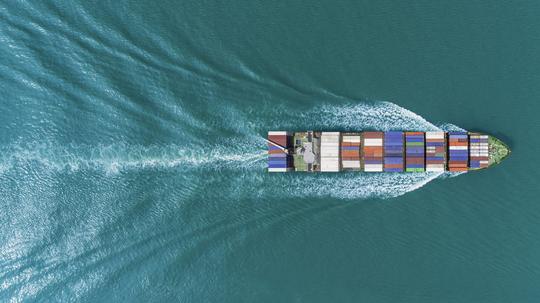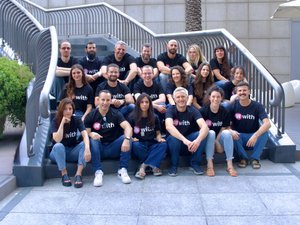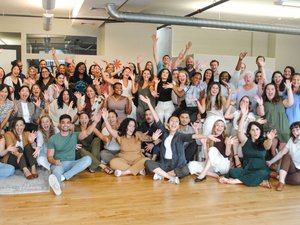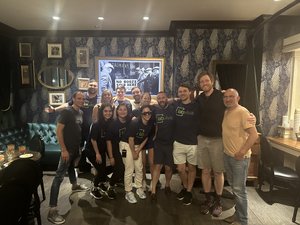
Suzanne Greene spends her days thinking about supply chains.
She's aware that doesn't sound like the sexiest research, but it's key to ensuring that companies are able to calculate their carbon footprints—the amount of carbon dioxide and related compounds whose release they're responsible for. Greene's days are spent helping corporations not only do that math, but set goals to reduce their emissions and increase their sustainability overall as climate change rapidly accelerates.
"You hear many companies making big claims—'we're going to net-zero, carbon-neutral,' whatever the goal is," Greene said. "When it comes to transportation, it gets complicated because most transportation is operated with fossil fuel. What does carbon zero look like when the equipment isn't available to do that?"
Greene is the program manager of the Sustainable Supply Chains initiative at the MIT Center for Transportation and Logistics. Her research focuses largely on metals, minerals and freight transport, which are all linked to the agriculture, renewable energy, building materials and IT industries.
She is also an expert advisor for the Smart Freight Centre and Global Logistics Emissions (GLEC), co-author of the GLEC Framework and author of the Black Carbon Methodology for the Logistics Sector.
BostInno caught up with Greene over the phone to talk about her research, Earth Day and how individuals can start thinking about their own power to influence companies' sustainability goals. This interview has been lightly edited for length and clarity.
You study sustainability in supply chains. Could you explain, in layman's terms, what exactly your research looks like?
We think a lot about transportation, but we also think a lot about how the goods get to you in general, you know—mining, transportation, manufacturing, all the different steps along the supply chain. We tend to be very practical. The research that we do is usually a real-life problem. We're less in the theoretical zone and more solving the challenge that a company might have or an industry has and trying to find pragmatic solutions.
My goal is typically to get everybody doing sustainability. If you're a machine learning expert, hey, why don't you apply that to recycling? I'll try to come up with problems that researchers can apply their skills to and solve.
I'd love to hear about what you're working on now.
We have a couple projects, kind of themes at the moment. I work with companies to calculate their carbon footprint. I specifically work on transportation a lot of the time: What is your transportation carbon footprint? Let's say I just worked with a large IT firm that's shipping their products around the world. What does that look like when you don't actually own a truck or a ship or a plane? You have no transportation that you operate, so what is the carbon footprint of this service that you buy? That's something we can do analytically. But the question that gets more interesting is what you do once you have the information.
Setting a climate goal is something that's very interesting to me. How do you set it? What does it mean to reach it? And how can you reach it in a meaningful way for your company, not just planting trees? I really love trees, but there are different approaches you could take that could be more meaningful for your actual operation. If you're going to offset your CO2, where can you put it that it actually impacts your own supply chain and the people that are along that supply chain?
Another project we have is looking at recycling. How can we improve the take-back of plastic? Because right now, recycling systems are quite broken.
Well, and China has decided they're not taking our recycling anymore.
They don't take it anymore, and that has led to some chaos. We don't even know, a lot of the time, what is happening. Some places are just trashing it. Some places are burning it, making energy, and that is actually considered renewable energy, whether you like that feeling or not. Some countries and states do incinerate it. Sometimes, it gets recycled.
What we're looking at right now with a large consumer packaged goods company is what can they do to ensure their stuff gets recycled. It's like a climate goal, where companies are making pledges in terms of their plastics. 'We're going to make our goods with recyclable plastic. We're going to redesign our toothbrush so it can be recycled. Or we're going to promise to use recycled content in our products.' There are these big promises that are happening, but it's really hard to actually do that. The system isn't available. It's actually extremely parallel problem to the climate goal. We see this world that we want. I think it really comes from people like you and me that want things to be better. The system isn't there. We need to build the system to meet these promises.
It seems like a lot of different things to think about. Is there ever any one focus area that you find yourself coming back to in different projects?
Sustainability is a very broad term. You can apply it in many terms. Most people have an area of focus to talk about. I'm always talking about carbon footprints. Like, O.K., here's the question of recycling, but how can we weave in understanding the carbon footprint of recycling while we're tackling these bigger issues? I feel like most researchers have a thing that we try to weave in.
Certainly for the first time in my life, as someone who's not in this world, it seems like supply chains have become part of the national conversation. People are talking about supply chains when it comes to toilet paper, sliced bread on the shelves, personal protective equipment for health care workers and swabs. As someone who researches supply chains in your everyday, what is this moment like for you?
It's kind of fun. Now my mom knows what I'm talking about. [laughs] Everyone's thinking about supply chains of our masks and equipment, but also vaccines. We're going to want that coronavirus vaccine, and we're going to want those testing kits. Ramping that up is a supply chain. In a way, we've been saying the same thing for a long time, but now, people are noticing and paying more attention. They're trying to figure out, where is this stuff coming from? That's a question we always want to ask: Where is the stuff coming from when you buy it, and where does it go after it leaves your hands? Those are all parts of the supply chain. We want people actively wondering about that, because that's how we're going to get to sustainability.
One thing that I think about every Earth Day is that much of it tends to focus on ways that individuals can improve their own ecological habits. You've got the three Rs. Messaging is very much on personal responsibility. You work with companies, so I wonder if there's any lessons that you've taken from your work and your research that some individuals might take away.
We can influence these huge companies, big time, when we speak up about what we're concerned about, or what we want to see, or something we're not happy with that a company is doing. I think people underestimate their power—the power of a tweet, the power of your sign at the protest. In the end, companies are made up of people that are just humans. I think most people are good people, and they want good for the world, too. Companies listen to us. They listen to the consumer. They're doing everything for us. As soon as they get bad press, they're going to want to change. Something I like to empower people with is: You should ask more questions of the companies you're giving your money to and get information. You can ask about the carbon footprint of the thing you're buying. We can ask that question.
When you ask, that's when we see things start to change. That's part of why I work on these methods. I write methods for carbon accounting, like how should you do your carbon footprint calculation. If you made a net-zero promise, you're going need to know your numbers. You're going to need to calculate your carbon footprint. You need to know the footprint of your suppliers, the products and the services. I would love regular people to be asking those questions to move things forward.
Have you seen forward movement over the last couple years?
Definitely. A lot of movement. The methodologies have helped shore up the numbers. For a long time, it was like, 'Ah, you can't trust the number, it's not accurate.' Well, follow the method. You should trust the number. Adding climate goals has added another layer. You don't want to say you're committing to a 50 percent reduction when you don't even know what you're starting from. I think companies like Microsoft have upped the ante, saying they're going account for all future and historic carbon emissions.
Thank you so much for this, Suzanne. Is there anything I haven't asked about that you want to add?
We can have the future we want. We can do it. It's not out of reach. The technologies are there. We have what we need. We can still innovate, but with what we know now, we can do it. I want people to feel hopeful.








